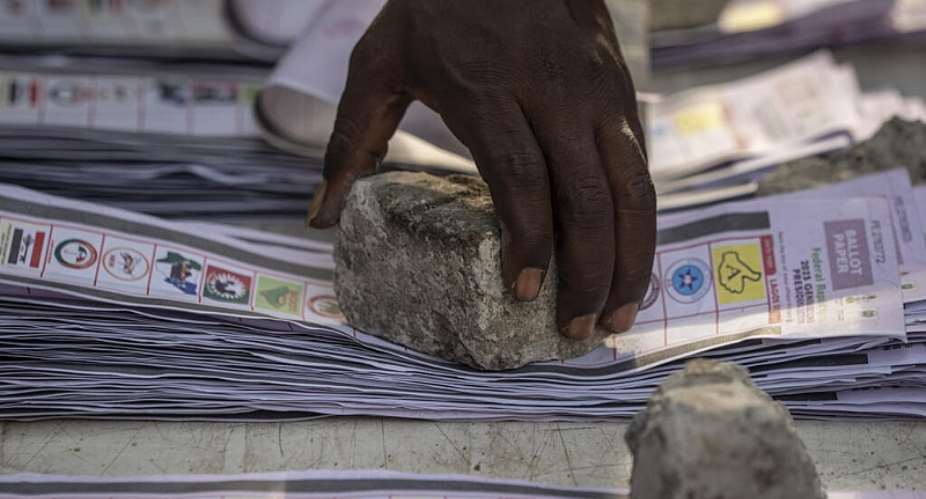Counting has begun in the wake of Saturday's Nigerian elections. The ballot of 90 million registered voters has been described as broadly smooth and peaceful, despite reports of isolated violence, delays and technical hitches. The electoral authorities have given no date for the announcement of results, but the outcome must be declared within 14 days.
The election pits former Lagos governor and APC candidate Bola Tinubu, 70, against former vice president and PDP candidate Atiku Abubakar, who at 76 is on his sixth bid for the nation's top job.
For the first time since the end of military rule in 1999, a third candidate, Labour's Peter Obi, has challenged the APC and PDP dominance with a campaign message of change.
Tinubu is a southern Yoruba Muslim, Abubakar is an ethnic Fulani Muslim from the northeast, and Obi is a Christian Igbo from the southeast.
After two terms under President Muhammadu Buhari, the new leader will have to tackle widespread insecurity, unemployment and poverty.
Some analysts are forecasting an unprecedented, second-round runoff between the two frontrunners if no candidate meets election requirements.
To win the presidency, a candidate must not only obtain the most votes, but also win at least 25 percent in two-thirds of Nigeria's 36 states.
Mostly peaceful
In a country where elections are often marred by attacks, violent clashes between rival supporters, and ethnic tensions, Saturday's exercise was mostly peaceful.
Several Lagos polling booths were ransacked, according to the Independent National Electoral Commission (INEC), voter ID machines were stolen in other states and voting at 141 polling units in southern Bayelsa State will take place on Sunday after the ballot was disrupted.
Late starts by election officials and technical difficulties with voter ID technology created huge delays in some polling centres in Lagos and other cities. In Kano city in the northwest, voting materials arrived five hours after official opening time at some polling stations.
Voters also cast ballots for Nigeria's two houses of parliament, the National Assembly and Senate.
Insecurity was a major election issue, with Nigeria still battling a 14-year jihadist insurgency in the northeast, armed bandits in the northwest and separatist militia in the southeast.
Inflation in Nigeria is running at more than 20 percent.
By law, election results must be officially announced within two weeks of voting.





 'Kill whoever will rig Ejisu by-election' – Independent Candidate supporters inv...
'Kill whoever will rig Ejisu by-election' – Independent Candidate supporters inv...
 Ashanti Region: ‘Apologize to me for claiming I owe electricity bills else... – ...
Ashanti Region: ‘Apologize to me for claiming I owe electricity bills else... – ...
 Ghana is a mess; citizens will stand for their party even if they’re dying — Kof...
Ghana is a mess; citizens will stand for their party even if they’re dying — Kof...
 Internet shutdown an abuse of human rights — CSOs to gov't
Internet shutdown an abuse of human rights — CSOs to gov't
 Free SHS policy: Eating Tom Brown in the morning, afternoon, evening will be a t...
Free SHS policy: Eating Tom Brown in the morning, afternoon, evening will be a t...
 Dumsor: A British energy expert 'lied' Ghanaians, causing us to abandon energy p...
Dumsor: A British energy expert 'lied' Ghanaians, causing us to abandon energy p...
 What a speech! — Imani Africa boss reacts to Prof. Opoku Agyemang’s presentation
What a speech! — Imani Africa boss reacts to Prof. Opoku Agyemang’s presentation
 Dumsor: Tell us the truth — Atik Mohammed to ECG
Dumsor: Tell us the truth — Atik Mohammed to ECG
 Dumsor: Don't rush to demand timetable; the problem may be temporary — Atik Moha...
Dumsor: Don't rush to demand timetable; the problem may be temporary — Atik Moha...
 Space X Starlink’s satellite broadband approved in Ghana — NCA
Space X Starlink’s satellite broadband approved in Ghana — NCA
